Hey there, cinema fans! Oh, you’re waiting for a night in with a movie that’s packed with drama, passion, and the right amount of spice. Korean adult films are more than steamy scenes—they’re a blend of deep storytelling, cultural richness, and some truly unforgettable moments. Whether you’re a seasoned fan or curious to see what all the buzz is about, get ready to explore a whole new side of Korean cinema. So, grab your favorite snacks, settle in, and let’s get this movie marathon started!
10 Korean adult movies (18+/Erotic K-Drama or TV series)
Korean adult movies refer to films produced in South Korea that contain mature content, usually sexual themes, explicit scenes, or narratives that revolve around adult relationships and desires. These movies address societal taboos and human relationships or focus on the psychological aspects of sexuality.
Unlike some adult movies from other industries that may focus solely on erotic content, Korean adult films weave mature themes into intricate storylines, providing a balanced mix of narrative depth and sensuality.
As the Korean film industry evolves, more directors are willing to push societal boundaries and explore taboo or controversial topics, leading to groundbreaking cinema. The global popularity of Korean culture, referred to as the “Hallyu” or “K-Wave,” encompasses K-pop, K-dramas, and K-movies.
Korean adult film industry offers a different cultural perspective on sexuality, relationships, and societal norms than Western films. Here are ten popular movies for you. Let’s watch!
| Movie | Director | IMDb Rating |
|---|---|---|
| Oldboy (2003) | Park Chan-wook | 8.4/10 |
| The Handmaiden (2016) | Park Chan-wook | 8.1/10 |
| Lies (1999) | Jang Sun-woo | 5.5/10 |
| A Bittersweet Life (2005) | Kim Jee-woon | 7.5/10 |
| Thirst (2009) | Park Chan-wook | 7.1/10 |
| Nevertheless (2021) | Kim Ga-ram | 7.1/10 |
| Samaritan Girl (2004) | Kim Ki-duk | 7.0/10 |
| The Housemaid (2010) | Kim Ki-young | 6.4/10 |
| Obsessed (2014) | Dae-woo Kim | 6.2/10 |
| The Bow (2005) | Kim Ki-duk | 7.1/10 |
1. Oldboy (2003, Park Chan-wook)
Oldboy (올드보이) is one of the most-watched films to emerge from South Korea, gaining significant international recognition and fame.
Rotten Tomatoes: 83%
Synopsis: This thrilling adult movie tells the story of Oh Dae-su, a man who is inexplicably imprisoned in a cell for 15 years and then released. Upon his release, he’s given clothes, a phone, and money and is left with a burning desire for revenge. He goes on a relentless quest to find and confront his captor while uncovering dark secrets about his past.
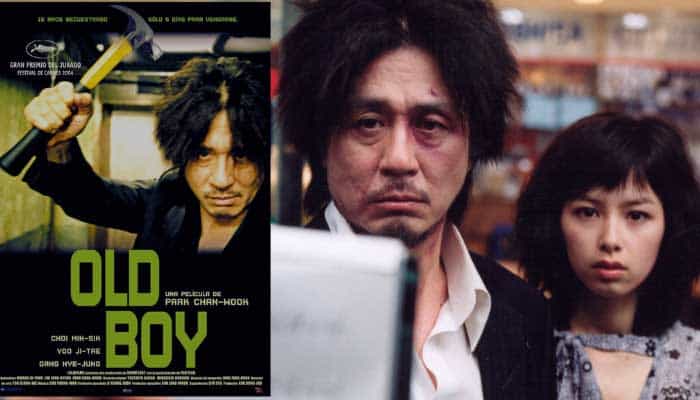
Cinematography and Visuals: The film is popular for its distinct visual style, with several iconic scenes, including a memorable one-take hallway fight sequence where Dae-su fends off numerous attackers with a hammer. The mature and sometimes graphic content is unique and amazing.
Storytelling: Oldboy has a dense and intricate plot that features several twists and turns, many of which challenge the viewer’s expectations and provoke strong emotional reactions.
Themes: The film focuses deeply on themes of revenge, memory, love, and the nature of evil. It explores what drives a person to seek revenge and at what cost.
Performances: Choi Min-sik’s portrayal of Oh Dae-su is particularly celebrated. His transformation and descent into obsession are palpable, giving depth and humanity to the film’s intense narrative.
Soundtrack: The film features a memorable score, which complements the intense emotions and events of the narrative.
Reception & Impact: This is the second installment in director Park Chan-wook’s “Vengeance Trilogy,” preceded by “Sympathy for Mr. Vengeance” and followed by “Lady Vengeance.” The film won the Grand Prix at the 2004 Cannes Film Festival and has since become a cult classic. Its influence can be seen in various films worldwide, inspiring debates and discussions regarding its narrative, themes, and ethical considerations.
2. The Handmaiden (2016, Park Chan-wook)
The Handmaiden (아가씨) is another 18+ film from South Korea. Inspired by the British novel “Fingersmith” by Sarah Waters, the story is transposed to Korea during the Japanese occupation in the 1930s.
Synopsis: The film is a deception, romance, and suspense tale. It shows a young Korean woman named Sook-hee, hired as a handmaiden by a wealthy Japanese heiress named Lady Hideko. However, Sook-hee is secretly in cahoots with a conman who plans to seduce Lady Hideko, marry her, and then commit her to an asylum to take her wealth. But as Sook-hee starts living with Lady Hideko, unexpected emotions, loyalties, and relationships emerge, complicating the initial plan.
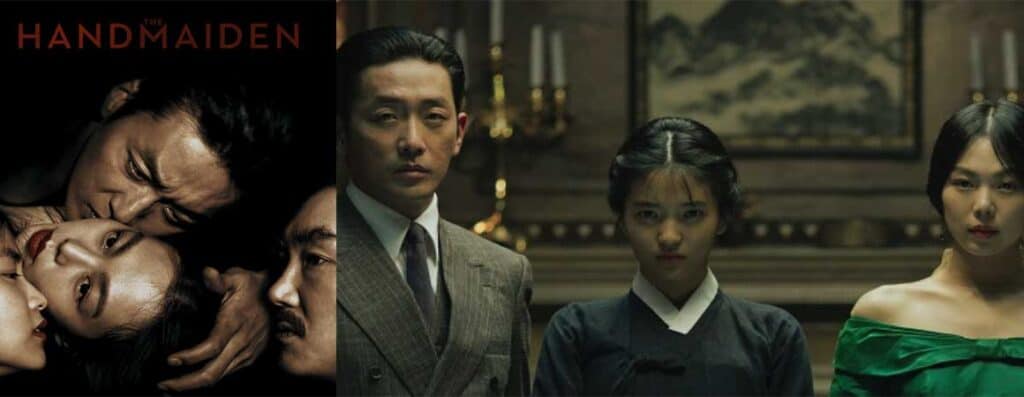
Narrative Structure: The film is divided into three parts, each offering different perspectives on the unfolding events. This structure gives depth to characters and events, revealing surprises at each turn.
Cinematography and Visuals: The film boasts stunning visuals, from the intricate details of the mansion where most of the action unfolds to the lush landscapes surrounding it.
Themes: The movie explores themes of love, betrayal, societal constraints, and the concept of freedom. It focuses on the power dynamics of relationships, both on personal and societal levels. Eroticism plays a significant role in the narrative, driving the plot and character relationships.
Performances: The lead performances, especially by Kim Tae-ri (Sook-hee) and Kim Min-hee (Lady Hideko), are praised for their depth, nuance, and chemistry.
Soundtrack: The score of the film, by Jo Yeong-wook, perfectly complements the suspense and emotions of the narrative, further enhancing your movie-watching experience.
Reception & Impact: The film was lauded for its storytelling, performances, and technical prowess. Its LGBTQ+ themes and representation were appreciated for adding depth and modern relevance.
3. Lies (1999, Jang Sun-woo)
In the 90s, South Korea was going through a period of rapid modernization and cultural change. This was a time when filmmakers began pushing boundaries, and “Lies” ((거짓말, Gojitmal) stands as a testament to this movement. Given the traditionally conservative stance on sexuality in Korean culture, the film’s very existence challenges societal norms.
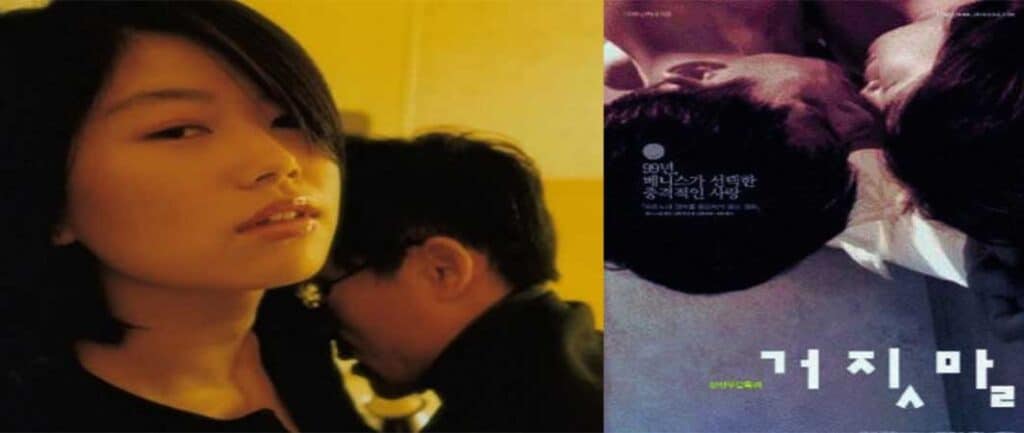
Narrative and Themes: The plot explores an illicit relationship between a sculptor and a high school student, diving deep into the world of sadomasochism. But beneath its explicit surface, the movie explores human desire’s complexities, relationships’ nature, and the boundaries between love, obsession, and self-destruction.
Human Desire and Obsession: J and Y’s relationship transcends traditional romantic norms. It’s an exploration of raw human desire. Their obsession, fueled by their sexual escapades, is a metaphor for humanity’s tendency to push boundaries in search of meaning or fulfillment.
Societal Judgement: The film continually places its characters in situations where they’re judged or criticized, be it by family, friends, or society at large. This mirrors the film’s scrutiny upon release, turning it into a meta-commentary on its societal reception.
Performances: Both main actors took significant risks with their roles, bringing authenticity to their characters. Their performances help anchor the film, making it more than just a series of explicit scenes.
Direction: Jang Sun-woo’s direction is both audacious and contemplative. He doesn’t shy away from the explicit content but ensures that the characters’ emotional journeys are not overshadowed.
Impact and Reception: This adult film offers a plethora of avenues to explore, from its narrative themes to societal impact. It is a testament to cinema’s power to challenge, provoke, and instigate change.
4. A Bittersweet Life (2005, Kim Jee-woon)
A Bittersweet Life (달콤한 인생) is a stylish and emotionally charged South Korean action-noir romantic film. It mixes drama, crime, and action, all set against the backdrop of the Korean gangster world.
Synopsis: The story follows Sun-woo, a loyal enforcer and hotel manager for a crime boss named Kang. Sun-woo’s life takes a turn when Kang tasks him with surveilling his young girlfriend, Hee-soo, whom he suspects of having an affair with another man.
Kang gives Sun-woo clear instructions to deal with the situation (implying violence) if he finds out she’s cheating. However, when Sun-woo discovers the truth, he chooses out of compassion, which leads to severe repercussions and sets him on a path of vengeance and self-discovery.
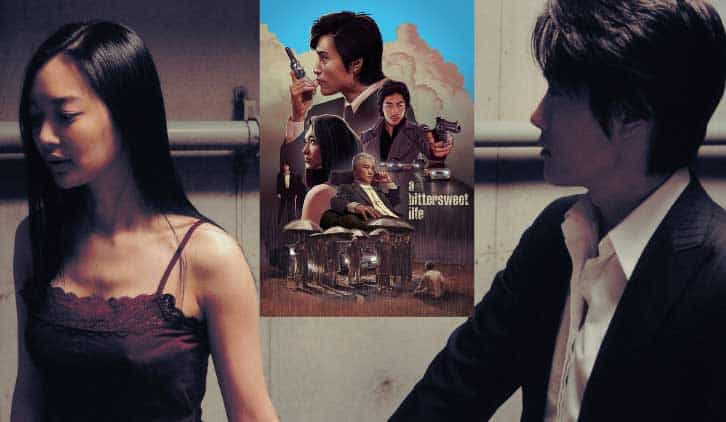
Characters Development: Sun-woo’s transformation from a stoic enforcer to a man grappling with his emotions and actions is central to the narrative. His internal conflict provides depth to what could have been a straightforward action film.
Cinematography and Visuals: The film boasts meticulous framing and visually striking sequences. Kim Jee-woon’s style elevates even the most violent scenes into something akin to a dark ballet.
Action Sequences: This film is well-choreographed, brutal, and beautiful.
Themes: The film represents loyalty, existential angst, love, lust, and the consequences of one’s choices. It also touches upon the fleeting nature of life and happiness.
Performances: Lee Byung-hun’s portrayal of Sun-woo stands out. His ability to convey depth and emotion, especially through moments of silence, anchors the film.
Reception & Impact: Although this movie didn’t achieve massive commercial success initially, it has since gained cult status, especially among fans of Asian cinema and the action-noir genre. The movie further established Kim Jee-woon as a notable director and showcased Lee Byung-hun’s versatility as an actor.
5. Thirst (2009, Park Chan-wook)
Thirst (박쥐) is another unique offering from the acclaimed South Korean director Park Chan-wook, best known for his Vengeance Trilogy, especially “Oldboy.” Unlike his other films, “Thirst” ventures into the horror genre with the same depth, artistry, and complex character portrayals that Park is known for.
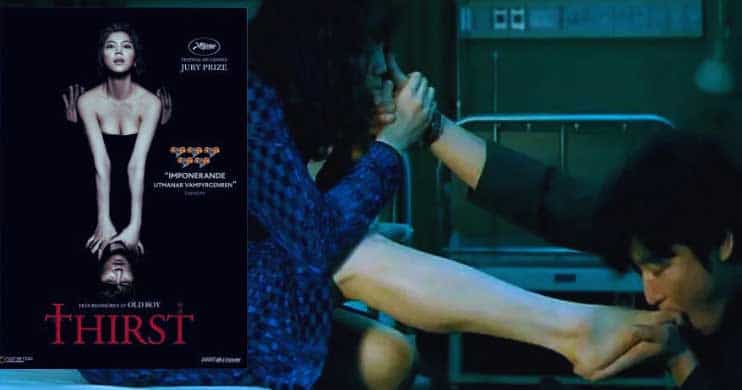
Synopsis: The film tells the story of Sang-hyun, a Catholic priest who volunteers for a medical experiment intending to help find a cure for a deadly virus. However, things go awry, and he becomes infected, leading to a blood transfusion that inadvertently turns him into a vampire.
He grapples with his new insatiable thirst for blood. Sang-hyun begins a morally and sexually charged relationship with Tae-ju, a childhood acquaintance’s wife, leading them down a dark and destructive path.
Genre: Horror, drama, romance, and dark comedy, reflecting Park’s signature genre-blending style.
Character Depth: The protagonist’s transformation from a devoted priest to a morally conflicted vampire is fascinating and tragic. The internal struggle between his innate goodness and newfound dark desires makes for a compelling watch.
Cinematography: Like most of Park’s films, “Thirst” boasts exquisite cinematography. The film’s use of color, particularly the contrast of red against a muted backdrop, is visually stunning and symbolic.
Themes: The film covers themes of morality, temptation, sacrifice, and the duality of human nature. It raises questions about what it means to be human and the thin line between desire and destruction.
Song Kang-ho’s portrayal of Sang-hyun is masterful. He captures the essence of a man in turmoil, torn between his duties as a priest and his newfound carnal desires. Kim Ok-bin, as Tae-ju, also delivers a standout performance, embodying a character that’s both victim and antagonist.
6. Nevertheless (2021, Kim Ga-ram)
Nevertheless is a popular South Korean adult television (Netflix) series based on the webtoon “알고있지만” by Jung Seo. The drama aired on JTBC and gained significant attention for portraying modern relationships, complicated romantic dynamics, and its introspective look into the complexities of love and intimacy.
Synopsis: The story follows two art students, Yoo Na-bi and Park Jae-eon. Yoo Na-bi, having experienced a painful heartbreak due to betrayal, no longer believes in love but still wishes for a relationship. Park Jae-eon is her polar opposite. He finds dating a waste of time but likes to get emotionally involved. Their paths cross at the university, and the series explores their evolving relationship, filled with undeniable attraction and complex emotions.
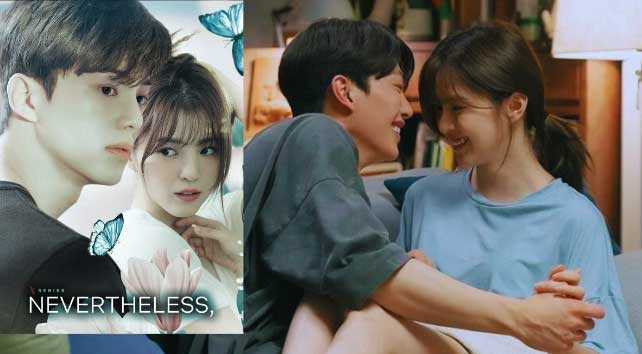
Character Dynamics: The chemistry between the lead characters is palpable. Their interactions oscillate between sweetness and tension, reflecting the uncertainties of modern relationships.
Visual Aesthetics: The cinematography and the art-centric setting give the series a dreamy, almost ethereal look. This, combined with a palette of muted pastels, adds a layer of romantic melancholy to the narrative.
Realistic Portrayal: “Nevertheless” stands out for its realistic depiction of young love and relationships. The characters grapple with genuine issues: commitment, trust, vulnerability, and the blurred lines between love and physical attraction.
Supporting Characters: The drama also focuses on the lives of the supporting characters, each facing their own set of romantic dilemmas, adding depth and multiple perspectives on love and relationships.
Reception & Impact: “Nevertheless” garnered attention for its mature and relatable portrayal of love and relationships among young adults. I resonated with the series, especially those navigating the complex world of modern romance. However, opinions were divided over the protagonists’ decisions and relationship dynamics, with some finding them frustrating. In many ways, this division showcased the show’s success in provoking thought and discussion on the intricacies of love.
7. Samaritan Girl (2004, Kim Ki-duk)
Samaritan Girl (사마리아) is a blend of stark realism, poetic imagery, and controversial subjects. The film’s take on sexuality, innocence, and societal norms can indicate the societal undercurrents of the time. Whether the film critiques the commodification of the female body or participates in that very commodification is a significant area of debate.
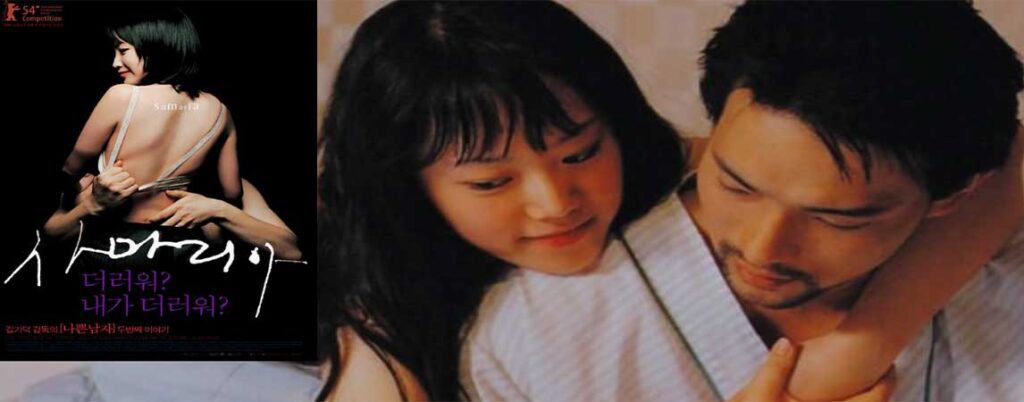
Synopsis: The movie introduces Yeo-jin and Jae-yeong, two close-knit teenage girls. They share a dream of traveling to Europe. To fund their dream trip, Jae-yeong becomes a prostitute. Yeo-jin, the more reserved of the two, helps by acting as a manager. She sets up appointments, ensures Jae-yeong’s safety from a distance, and collects the money.
Comparing “Samaritan Girl” with other adult films that tackle similar themes, both within and outside the Korean cinema, can highlight cultural differences and similarities in handling such topics.
8. The Housemaid (2010)
The Housemaid (하녀) is a South Korean psychological thriller and a modern-day remake of the 1960 film of the same name directed by Kim Ki-young.
Overview: The story is about Eun-yi, a young woman hired as a housemaid for a wealthy family living in a grand mansion. The family consists of Hoon, a successful businessman; his pregnant wife, Hae-ra; and their young daughter, Nami. As Eun-yi becomes more integrated into the family, she and Hoon begin an illicit affair.
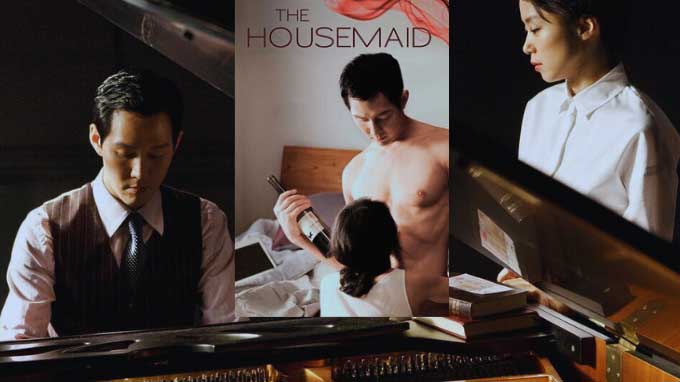
However, things turn dark as secrets are revealed, betrayals are uncovered, and tensions rise. Eun-yi becomes the focal point of the family’s unraveling, especially when she becomes pregnant and the two other women in the household, Hae-ra and the elder housekeeper, Byung-sik, decide to take matters into their own hands.
The affair between Eun-yi and Hoon serves as a plot device and a representation of power play, vulnerability, and manipulation. The film’s lush and sterile visual reflects the characters’ luxurious yet cold environment. Jeon Do-yeon’s portrayal of Eun-yi was highly praised, as were the performances of the rest of the cast.
9. Obsessed (2014, Dae-woo Kim)
Obsessed (인간중독) is a South Korean erotic melodrama.
Overview: Set in 1969, at the end of the Vietnam War, the film takes place on an army base in Korea. The story revolves around Colonel Kim Jin-pyong, a decorated war hero struggling with the trauma from his experiences in the Vietnam War, leading to issues with his mental health.
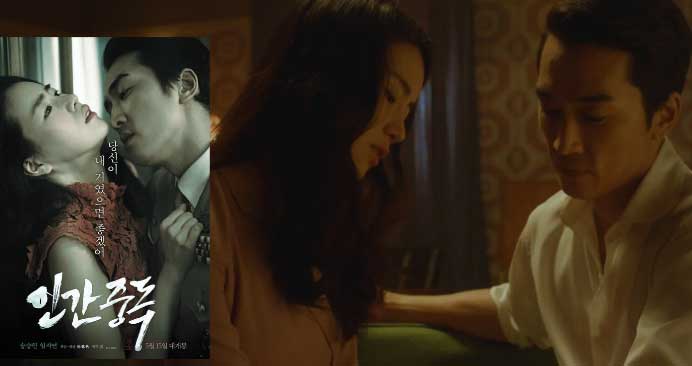
Jin-pyong lives a seemingly perfect life with his family but feels trapped and unsatisfied. His world is shaken when he encounters the wife of his subordinate, Jong Ga-heun. Drawn to her, he goes on a passionate and secretive affair with Ga-heun, intensifying as the narrative progresses. As the affair continues, the tension between personal desires, duties, and societal expectations rises, leading to dramatic consequences.
The core of the narrative is the passionate and secret affair, which, considering Jin-pyong’s status and the conservative nature of society at the time, is a significant taboo. If you appreciate films that meld drama with erotic tension while also addressing societal issues, “Obsessed” is an intriguing watch
10. The Bow (2005, Kim Ki-duk)
The Bow (활) is a South Korean adult drama film.
Overview: The story is set on a fishing boat that floats on the sea, away from the mainland. The film follows an old man and a teenage girl who live on a boat. They have been living together for a decade, and the old man has cared for the girl since she was a child. Their relationship is complex, with the old man planning to marry the girl when she turns 17.

Their life’s quiet and repetitive nature is disrupted when a young man comes aboard as a passenger, leading to a love triangle. The appearance of the young man stirs emotions, jealousy, and conflicts. Throughout the film, the old man uses a bow to shoot arrows and a musical instrument, a symbol with multiple layers of meaning in the narrative. The age difference, combined with the intention of marriage, raises questions about love, possession, and morality.
10 Korean adult movies Netflix
If you’re interested in mature K-dramas, watch for new releases, as the Korean entertainment industry has been gradually producing content that pushes traditional boundaries. Here are 10 Korean films with mature content that have been known to be on Netflix:
Love Alarm: This is a series based on the webtoon of the same name. While it’s not explicitly erotic, it does focus on adult themes of love and relationships in a world where an app tells you if someone within a 10-meter radius has romantic feelings for you.

Lie With Me (2021): This drama has drawn attention for its adult themes, being promoted as one of the first Korean erotic dramas. It is about a woman who, after experiencing a traumatic event, begins to lose her boundaries and gets involved in risky relationships.
My Holo Love: This is a romantic drama series that, while not overtly erotic, explores adult themes and relationships, focusing on a woman who falls in love with an AI hologram.
The World of the Married: Based on the British series “Doctor Foster,” this drama touches on mature themes, including infidelity and the complexities of adult relationships.
Elegant Friends: This drama showcases the lives of couples in their 40s, touching on various mature themes, including relationships, betrayals, and hidden secrets.
Burning (2018, Lee Chang-dong): Based on a short story by Haruki Murakami, this psychological mystery drama focuses on the life of a young man who reconnects with a former classmate, only to get entangled in a mysterious scenario when she returns from a trip with a new friend.
Time to Hunt (2020, Yoon Sung-hyun): A dystopian thriller where four friends plan a heist to escape their crumbling society but find themselves hunted by a mysterious assassin.
Forgotten (2017, Jang Hang-jun): This mystery thriller tells the story of a young man whose life spirals into chaos when his older brother is kidnapped and returns with no memory of his ordeal 19 days later.
Svaha: The Sixth Finger (2019, Jang Jae-hyun): A gripping mystery thriller that follows a pastor working to expose suspicious religious groups, stumbling upon a far more sinister group than he expected.
The Call (2020, Lee Chung-hyun): A suspenseful thriller about two women living in different periods who connect via an old phone, leading to unexpected consequences.
Note: Check the availability on Netflix, as it may vary by region. These films, while containing erotic elements, also offer significant commentary on societal norms, human psychology, and the complexities of relationships.
Last Words
Wow, what a ride, huh? These movies really have a way of drawing you in with their intense emotions and captivating plots. They offer a unique blend of romance and drama that’s hard to find anywhere else. So, if you’re looking to add a little excitement to your movie nights, these films are a perfect choice. And hey, don’t keep the fun all to yourself—invite some friends over and share the experience. You might find a new favorite together. Until next time, keep exploring and enjoying the magic of cinema. Happy watching!
Watch more:




